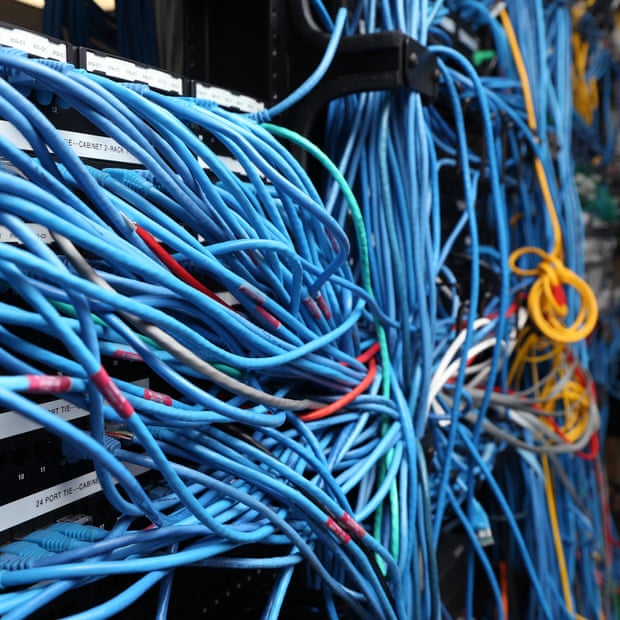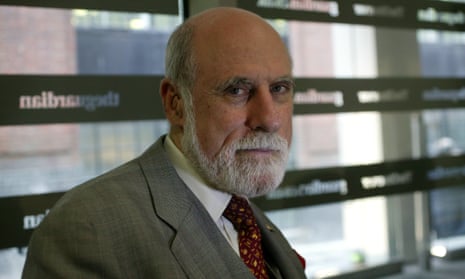More than 20 internet pioneers and leaders including the “father of the internet”, Vint Cerf; the inventor of the world wide web, Tim Berners-Lee; and the Apple co-founder Steve Wozniak have urged the FCC to cancel its vote to repeal net neutrality, describing the plan as “based on a flawed and factually inaccurate” understanding of how the internet works.
“The FCC’s rushed and technically incorrect proposed order to repeal net neutrality protections without any replacement is an imminent threat to the internet we worked so hard to create. It should be stopped,” said the technology luminaries in an open letter to lawmakers with oversight of the Federal Communications Commission on Monday.
Quick GuideNet neutrality
Show

What is net neutrality?
Net neutrality is the idea that internet service providers (ISPs) treat everyone’s data equally – whether that’s an email from your mother, a bank transfer or a streamed episode of Stranger Things. It means that ISPs, which control the delivery pipes, don’t get to choose which data is sent more quickly, or which sites get blocked or throttled (for example, slowing the delivery of a TV show because it is streamed by a video company that competes with a subsidiary of the ISP) or who has to pay extra. For this reason, some have described net neutrality as the “first amendment of the internet”.
Why is net neutrality under threat?
On 14 December 2017, the US Federal Communications Commission (FCC) voted to scrap regulations protecting net neutrality in America. In a 3-2 vote, the commission repealed the rules, which had been introduced by the Obama administration in 2015 to replace the patchwork of authorisations that had previously regulated the internet.
In response, a number of states vowed to introduce their own state-wide protections of net neutrality.
Who benefits from the FCC ruling?
The most obvious beneficiaries are the large ISPs, who frequently have local monopolies and have now been handed the ability to discriminate between their own services and those of competitors, and charge other companies for access or bandwidth.
But larger internet companies, such as Google or Facebook, are also likely to benefit from the decision. They stand little risk of being blocked or throttled, given how unpopular such a move would be, and can afford to pay access fees. They would also benefit from the reduced competition from smaller firms and startups, who are at risk of discrimination from ISPs.
Are there implications outside of the US?
Other nations have their own net neutrality regulations. The EU, for instance, passed a directive in 2016 guarding some key tenets of net neutrality, although allowing some controversial practices, such as "zero-rating" – declaring some sites free for the purposes of data limits.
But globally, internet users will experience the indirect effects of the US decision, since its impact on the competitive market within America's borders will ripple around the world. For some, that could even be positive: if new startups can't get traction in the US, they may decide to relocate elsewhere.
The letter refers to the FCC’s proposed Restoring Internet Freedom Order, which removes net neutrality protections introduced in 2015 to ensure that internet service providers (ISPs) such as Comcast, AT&T and Verizon would treat all web content and applications equally and not throttle, block or prioritise some content in return for payment.
The FCC’s vote on the proposed order is scheduled for 14 December and it is expected to be approved.
“It is important to understand that the FCC’s proposed order is based on a flawed and factually inaccurate understanding of Internet technology,” the internet pioneers state, adding that the flaws were outlined in detail in a 43-page comment submitted by 200 tech leaders to the FCC in July.
“Despite this comment, the FCC did not correct its misunderstandings.”
Over the last 15 years, both Republican and Democratic FCC chairs have supported and enforced the principles of net neutrality, believing it to be important for protecting open markets on the internet. Donald Trump’s FCC, headed by the former Verizon lawyer Ajit Pai, plans to break with convention, arguing that it is unnecessary regulation that is preventing ISPs from making money to fund new broadband infrastructure – something the ISPs themselves have denied when speaking to their investors.
The net neutrality rules have broad support from members of the public across the political spectrum, according to multiple polls. More than 22m comments were submitted to the FCC by members of the public in response to Pai’s proposal to scrap the rules, indicating that the public is “clearly passionate about protecting the internet”. Although the total number was inflated by spam and pre-populated form letters, 98.5% of the unique comments opposed the repeal, according to a study funded by ISPs.
Despite widespread public outcry, the FCC broke with established practice by not holding any public meetings to hear from citizens and experts about the appeal, the letter states.
Other signatories include Mitchell Baker, executive chairwoman of the Mozilla Foundation; Whitfield Diffie and Martin Hellman, pioneers of public-key cryptography; Brewster Kahle, founder of the Internet Archive; and Jennifer Rexford, chair of computer science at Princeton University.
They argue that the FCC should delay the vote until it has fully investigated the problems with the online commenting system and come up with an alternative way of protecting net neutrality principles.
